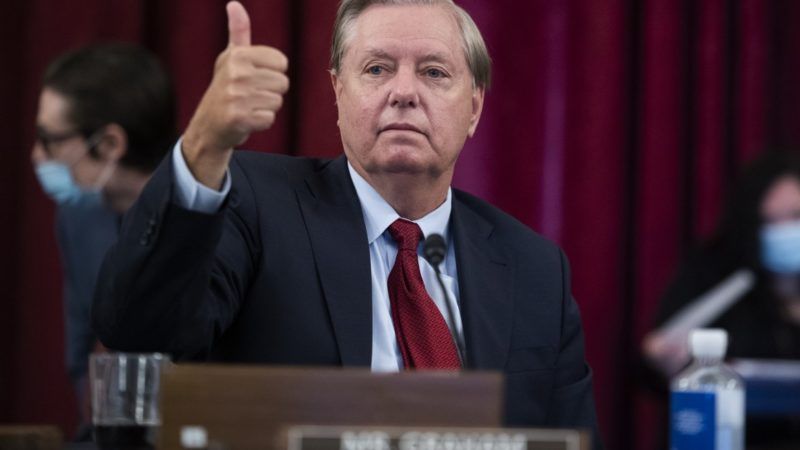Lindsey Graham's Terrible Anti-Privacy 'EARN IT' Act Passes Senate Committee
This isn't a bill about fighting child porn. Don't fall for it.

Bad news for freedom lovers as we approach Independence Day weekend: A bill compromising online speech and privacy just passed unanimously in the Senate's Judiciary Committee.
The "Eliminating Abusive and Rampant Neglect of Interactive Technologies [EARN IT] Act of 2020" purports to fight the spread of child pornography online. Page after page of the bill references child pornography and online child sexual exploitation as its reason for existence.
But what it actually does is create a federal commission that devises "best practices" policies that tech companies are expected to follow. The original version of the bill threatened that those who do not would lose protections of Section 230 of the Communications Decency Act, the law that generally protects platforms from liability for content posted by users. Days before passage, the power of the commission was softened, but the amendments now raise the specter of state-level enforcement that could compromise user privacy and force platforms to censor.
This commission would have had enormous power over online communications. It could push speech platforms to engage in any number of practices, from implementing age verification systems to compromising encryption on the behalf of federal investigators, as long as it can find an argument that the rule would help fight child pornography. In the original version of the bill, platforms that don't "voluntarily" follow the guidelines proposed by this commission (and endorsed by the attorney general) would have lost important protections against lawsuits over content posted by third parties.
Section 230 has nothing to do with either hosting or spreading child pornography. It doesn't protect child porn on any site, and it doesn't protect sites that host said content. As I noted back when Sen. Lindsey Graham (R–S.C.) first introduced this legislation, online service providers are already obliged under another federal law to pass along any information they have about child sexual exploitation on their platforms.
But the point of the EARN IT Act isn't to fight child porn; it's to get the government more deeply involved in setting the terms for online communications. Small wonder that so many tech privacy and civil rights activists oppose this bill.
Here's the American Civil Liberties Union blasting the legislation: "It provides no assistance for prevention programs and makes no attempt to address the root causes of the problem. Rather than provide measured solutions that would protect children, the EARN IT Act instead needlessly threatens our privacy and online speech rights."
Tech Freedom and Americans for Prosperity teamed up to send a letter to the Senate Judiciary Committee noting the bill's many flaws. They warn that amendments to the bill have made its impacts even murkier, and they worry that it creates a new "moderator's dilemma," where a platform's operators aggressively overmoderate and censor content because they're afraid of the legal consequences if they do not.
If "it is too easy to put [interactive computer service] providers on 'notice' of potentially unlawful content, the fear of liability will create a 'heckler's veto' that could be used to take down specific content or disable particular accounts," they warn. "Research consistently shows that platforms exposed to such liability receive numerous false accusations, and often follow the path of least resistance by simply removing lawful speech."
There is a piece of good news about this bad bill. In response to concerns that the EARN IT Act would force tech platforms to create encryption "back doors" so federal investigators can bypass protections, Sen. Patrick Leahy (D–Vt.) introduced an amendment specifying that the implementation of end-to-end encryption does not count as a violation of these regulations and does not give rise to civil and criminal liability. The amendment was approved and added to the bill.
Subsequent amendments to the bill have also weakened the commission, so that it has less direct control and cannot so easily order platforms to comply. But a new problem was added to the bill in the process: It gives the states power to implement anti-encryption policies and to push for criminal and civil penalties without proving that platforms were "knowingly" distributing child pornography. They just have to show the platforms were "reckless," a lower threshold that will certainly encourage the moderator's dilemma.
This is a poisonous proposal. Child porn is not protected by Section 230 or any other federal law, and the EARN IT Act would do nothing to fight its spread. Don't fall for this bill.
This post has been updated to describe some additional late amendments to the EARN IT Act.


Show Comments (52)